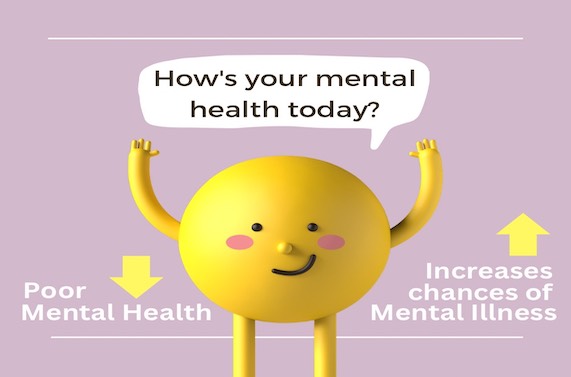
Written by Jennifer Cox LCPC
Let’s discuss mental health and mental illness – Consider them states of being that are on a spectrum.
Mental health refers to a person’s emotional, psychological, and social well-being – A person’s state of mental/emotional health. It affects how individuals think, feel, and act.
Good mental health is crucial for overall well-being and contributes to a person’s ability to:
-Cope with everyday challenges
-Handle stress
-Maintain healthy relationships
-Make decisions
-Achieve their full potential
Mental illness, also known as mental disorders or psychiatric disorders, refers to a wide range of conditions that affect a person’s thinking, feeling, mood, and behavior. Mental illnesses are diagnosed conditions which are characterized by various symptoms, that vary in severity and duration. There are many different types of mental illnesses, each of these disorders have their own specific symptoms and diagnostic criteria. These conditions can significantly impact an individual’s daily functioning, relationships, and overall well-being.
Mental illnesses can be caused by a combination of genetic, environmental, and psychological factors. They are not a result of personal weakness or character flaws. It is important to note that mental illnesses are treatable, and many individuals can recover completely or manage their symptoms with appropriate treatment and support.
Tips to boost your mental heath:
-Maintain a healthy lifestyle with basic self care: sleep, exercise, diet
-Track your mood to identify any trends among your days
-Thought log to identify what you are telling yourself daily, is it positive, negative, helpful, healthy, etc
-Identify and challenge your negative and unhelpful thoughts
-Build self awareness: Looking at yourself both subjectively and objectively, using both your emotional and reasonable minds
-Set goals and priorities: Things to strive for daily
-Learn to say “no” to new tasks if you start to feel like you’re taking on too much
-Practice gratitude: This can help shift your focus to the positive aspects of your life and improve your overall well-being
-Make time for activities that bring you joy and relaxation
-Practice mindfulness and relaxation techniques: Take time each day to practice mindfulness or relaxation exercises
-Limit exposure to negative news and social media: Constant exposure to negative news and social media can contribute to feelings of anxiety and stress
-Stay connected: Reach out to your friends or family members who can provide emotional support
-Seek professional help if needed: If you’re struggling with your mental health, don’t hesitate to seek help from a mental health professional, they can provide guidance, support, and treatment options
It is essential to prioritize mental health and seek appropriate support and treatment when needed. Mental health professionals, such as psychiatrists, psychologists, and counselors, can provide diagnosis, support, and treatment options. Since many people with poor mental health have not been formally diagnosed with a mental illness, they may struggle day after day.
Everyone’s mental health journey is different, and what works for one person may not work for another. It’s important to find strategies that work best for you and prioritize your mental health!
Mental illness can impact any of us. So, by promoting understanding, compassion, and support, we can create a society that embraces and empowers those living with mental health conditions.
Let us work together to create a world where mental health is prioritized – Where everyone feels safe and supported, empowered on their healing journey towards wellness.
Reach out today at info@echcounseling.com or 815-363-0864

